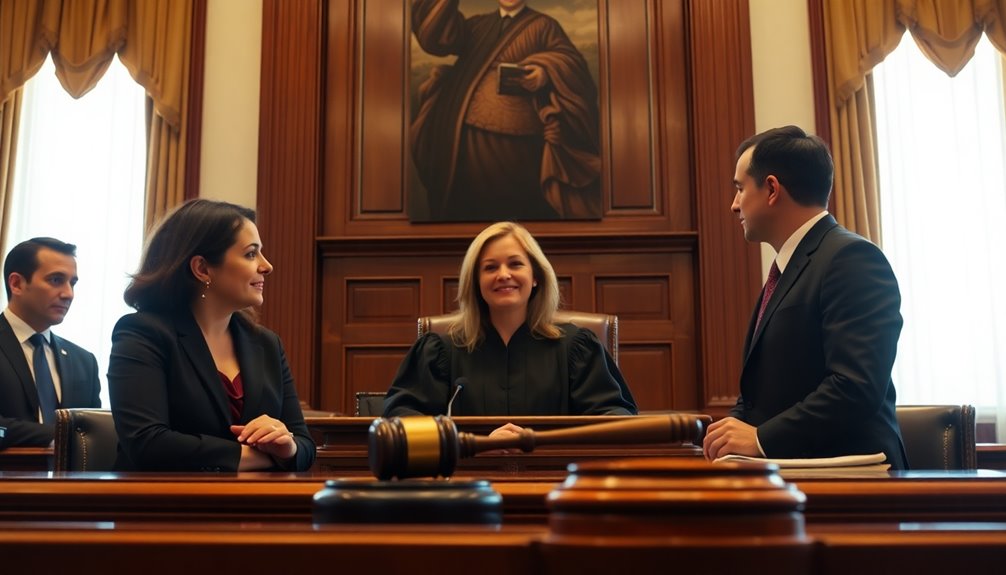You'll find that Coinbase recently scored a significant legal victory with Judge Failla's landmark decision allowing an interlocutory appeal. This ruling pauses district court proceedings while the Second Circuit reviews whether Coinbase's crypto transactions qualify as investment contracts under the Howey test. The decision brings attention to crucial regulatory distinctions that could shape the future of cryptocurrency laws. Enthusiasm is rising in the crypto community, as this victory offers clarity amid ongoing SEC allegations regarding unregistered securities. Curious about the potential implications for Coinbase and the industry? There's more to unpack.
Key Takeaways
- Judge Katherine Polk Failla granted Coinbase an interlocutory appeal, pausing district court proceedings for Second Circuit review of SEC allegations.
- The appeal centers on whether crypto transactions qualify as investment contracts under the Howey test, potentially reshaping cryptocurrency regulations.
- SEC claims Coinbase has operated as an unregistered exchange since 2019, impacting investor protections and compliance standards.
- The ruling acknowledges significant legal differences that require higher court guidance, fostering positive reactions within the cryptocurrency community.
- Coinbase's legal victory is seen as a pivotal moment, with industry leaders expressing optimism about the implications for the future of crypto regulations.
Overview of the Appeal
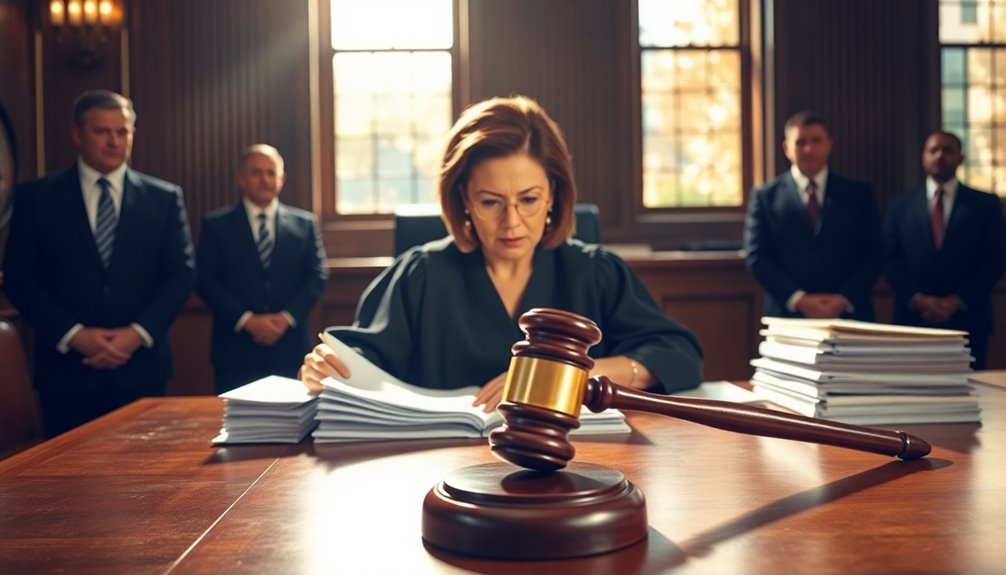
As Coinbase navigates the complexities of its legal battle, the recent grant of an interlocutory appeal marks a pivotal moment in the case.
This rare legal maneuver, approved by Judge Katherine Polk Failla, halts district court proceedings while the U.S. Court of Appeals for the Second Circuit reviews critical questions about securities law.
The appeal focuses on whether crypto transactions qualify as "investment contracts" under the Howey test, a decision that could clarify regulatory standards for digital assets. Judge Failla's decision acknowledges significant legal differences and the need for higher court guidance.
This development not only impacts Coinbase but also sets a precedent that could reshape the entire cryptocurrency landscape, influencing future regulatory actions and compliance requirements.
SEC's Allegations Against Coinbase
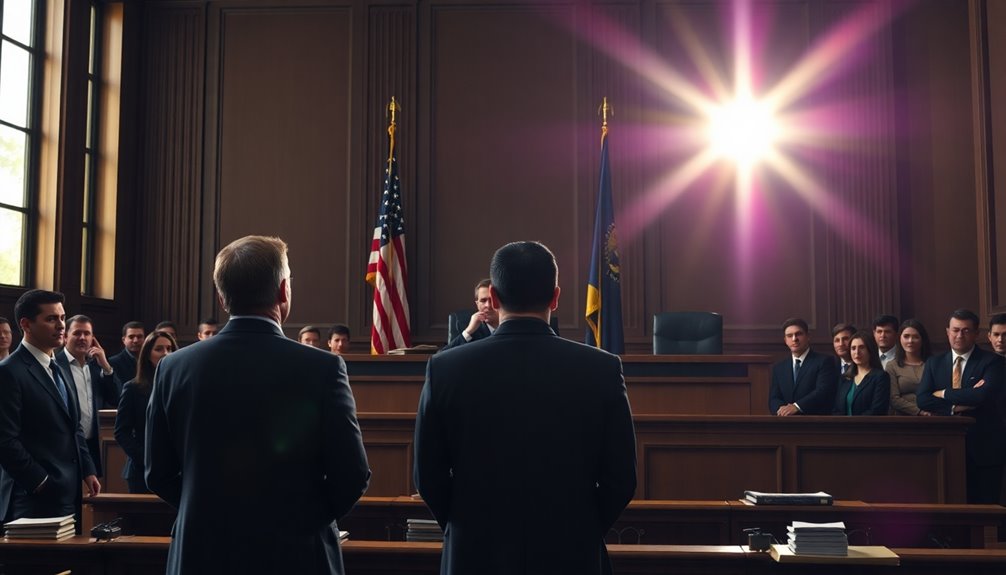
While Coinbase contends with its legal challenges, the SEC's allegations highlight significant concerns about the company's operations.
The SEC claims Coinbase has operated as an unregistered exchange, broker, and clearing agency since 2019, facilitating crypto asset securities trades without proper registration. This lack of registration has deprived you, the investor, of essential protections, such as SEC inspections and recordkeeping requirements. Additionally, Coinbase's staking-as-a-service program allegedly involved unregistered securities offerings, pooling customer assets for transaction validation without filing the necessary paperwork. If the SEC's case succeeds, Coinbase could face injunctive relief, hefty fines, and potential disgorgement of profits earned through these unregistered activities, raising serious questions about the company's compliance with securities laws. Moreover, the recent ruling granting Coinbase an interlocutory appeal may impact the outcome of the SEC's accusations and shape the future of crypto regulations.
Implications of the Howey Test
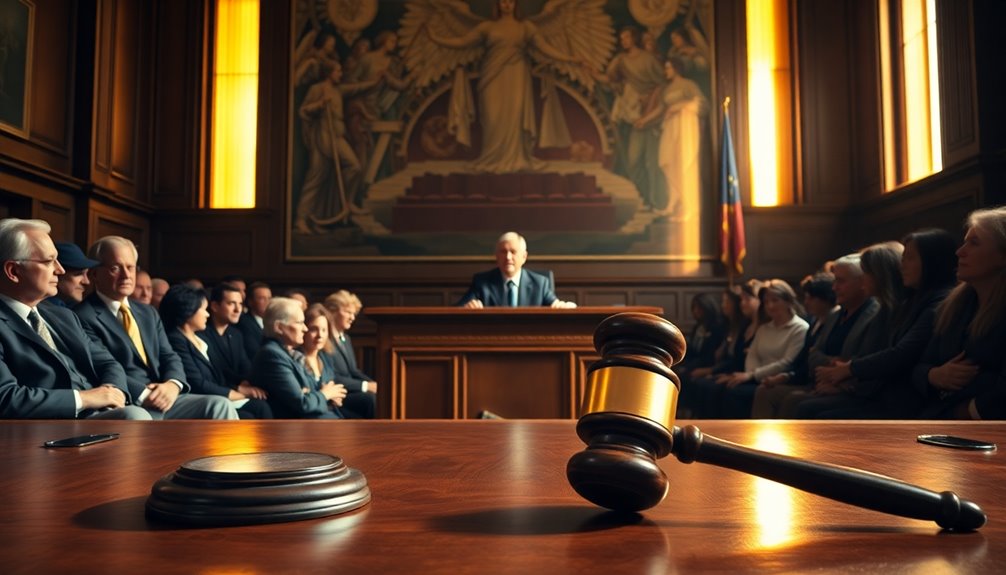
Understanding the implications of the Howey Test is crucial for anyone navigating the cryptocurrency landscape, especially given its role in determining whether digital assets qualify as securities.
If you're involved in ICOs, you need to recognize that many of these offerings likely meet the Howey criteria, which means they're subject to SEC regulations.
On the flip side, Bitcoin's decentralized nature exempts it from this classification, highlighting the test's complexity. The decentralized nature of cryptocurrencies can often lead to confusion regarding their regulatory status. The SEC classified The DAO tokens as securities in 2017, illustrating how the test applies to various projects.
The SEC's reliance on the Howey Test for enforcement actions means crypto companies must carefully assess their offerings.
Judge Failla's recent decision further emphasizes the need for clarity on these issues, potentially reshaping the regulatory framework that governs the entire cryptocurrency ecosystem.
Your compliance depends on understanding these nuances.
Community Reactions and Support

The recent legal victory for Coinbase has sparked a wave of enthusiasm within the cryptocurrency community. You can feel the excitement as industry leaders like Paul Grewal express gratitude for the court's careful consideration. Grewal compared the ruling to a referee pausing play to review a crucial call, highlighting its significance. Jake Chervinsky called it "huge," while Jeremy Hogan labeled it "big news in the legal crypto space." The ongoing discovery phase has faced significant delays, but the broader sentiment is that this win benefits the entire ecosystem. Amanda Tuminelli emphasizes the importance of staying the lawsuit during Coinbase's appeal, and the Blockchain Association's involvement shows strong support.
Legal Proceedings Explained
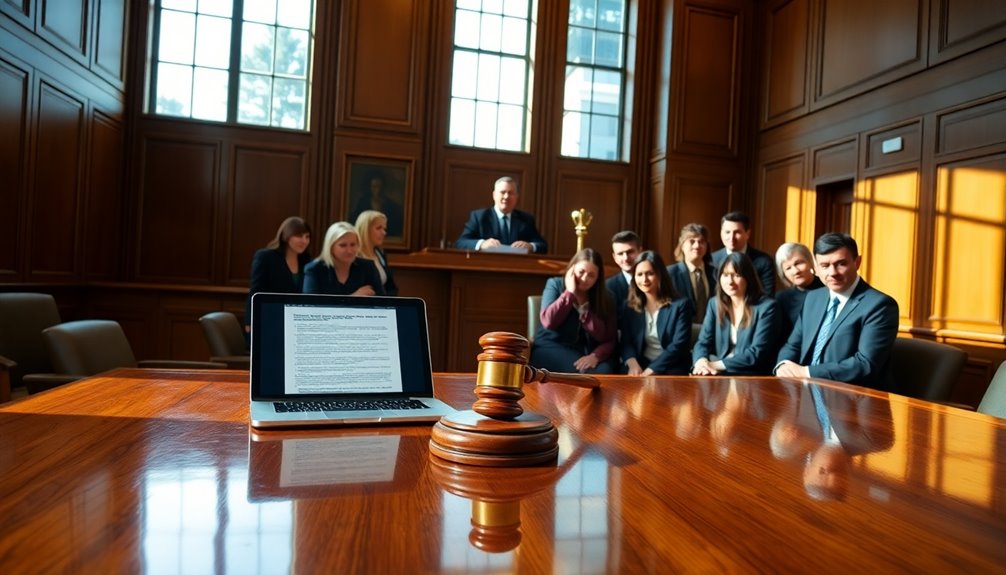
Coinbase's recent legal battle centers on allegations from the SEC, which claims the company operated as an unregistered exchange and broker.
The SEC's complaint, filed on June 6, 2023, asserts that Coinbase offered unregistered securities through its crypto offerings and staking program. The court accepted these allegations as true, denying Coinbase's motion for judgment. Judge Katherine Polk Failla granted an interlocutory appeal, allowing Coinbase to challenge these claims in the Second Circuit Court. The court's "ecosystem" approach to the Howey test raises fundamental questions about digital asset transactions as investment contracts. Notably, the court's ruling indicates that traditional securities principles may apply to crypto-assets, which could impact how future transactions are regulated. The proceedings are currently on hold until the appeal is resolved, with potential implications for regulatory compliance in the broader crypto market.
Regulatory Landscape Changes
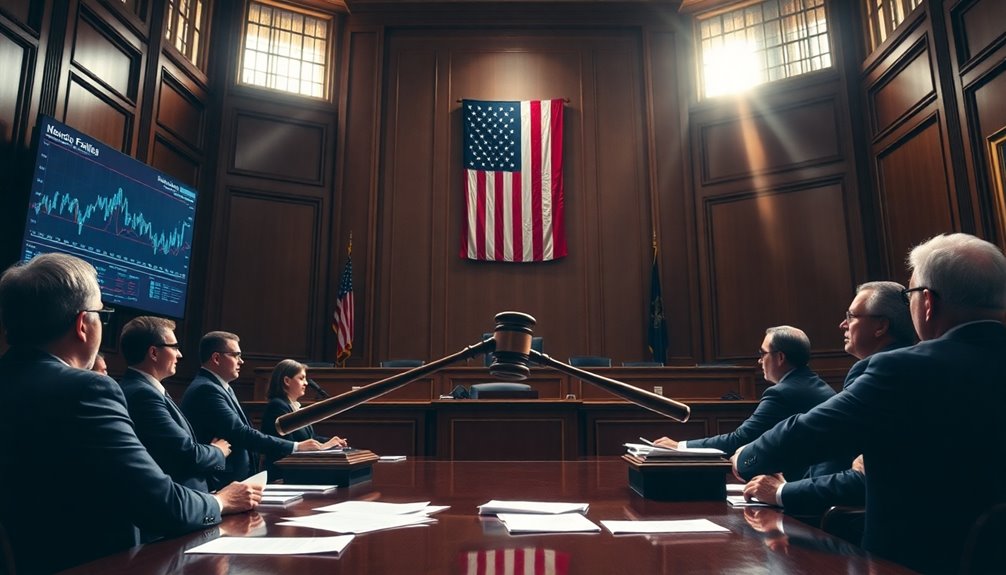
As regulatory bodies around the world adapt to the rapidly evolving landscape of digital assets, significant changes are shaping how cryptocurrencies are governed.
The European Union's MiCA regulation provides a thorough framework, while the OECD's CARF sets new cross-border tax reporting standards. In the U.S., states like Wyoming and Florida are adopting progressive legislation, and the federal government is forming a crypto advisory council. Institutional adoption of digital assets is also on the rise, further influencing regulatory frameworks.
Enhanced reporting requirements, including new Treasury regulations mandating Form 1099-DA by 2025, will impact tax compliance for exchanges.
Additionally, the incoming Trump administration's pro-crypto stance is expected to foster a more permissive regulatory environment, promoting transparency and stability in the crypto market, all while combating fraud and ensuring investor protection.
Comparison to Ripple Case

While both Coinbase and Ripple navigate similar legal waters, their cases highlight distinct challenges in the evolving regulatory landscape. Each company faces SEC allegations of operating without proper registration and offering unregistered securities, with both arguing that their digital assets don't qualify as investment contracts under the Howey test. The recent judge's ruling allowing Coinbase to appeal SEC claims further emphasizes the significance of these cases.
The outcomes could set significant precedents for the cryptocurrency industry. Procedurally, both cases have experienced delays and complexities, with interlocutory appeals granted to clarify key legal issues. Industry reactions indicate that these decisions could reshape regulatory approaches to digital assets, emphasizing the importance of clear guidelines. Ultimately, how these cases unfold will influence compliance requirements and future regulatory actions in the crypto space.
Frequently Asked Questions
What Is an Interlocutory Appeal in Legal Terms?
An interlocutory appeal is a legal process where you appeal a district court's decision before the case concludes.
It allows you to challenge a ruling that involves a significant legal question, which could impact the case's outcome.
To pursue this, the trial judge must certify the order, stating it involves a controlling legal question.
If granted, this appeal can halt lower court proceedings until the appellate court resolves the issue.
How Does the Howey Test Affect Investors' Rights?
The Howey Test significantly impacts your rights as an investor.
If an asset meets the criteria, you gain protection under federal securities laws, ensuring transparency and disclosure. This means you'll receive vital information about your investment, helping you understand potential risks and make informed decisions.
Additionally, if the investment violates these laws, you have legal recourse, providing you with an extra layer of security in your financial endeavors.
What Are the Potential Outcomes of the Appeal?
The potential outcomes of the appeal could significantly impact you and the cryptocurrency landscape.
If the Second Circuit upholds the appeal, you might see clearer guidelines on the Howey test, potentially reshaping regulatory approaches.
If denied, you could face prolonged litigation and stricter regulations.
A mixed ruling might provide some clarity but leave ongoing uncertainties.
Ultimately, each scenario could affect your investments and the overall market environment.
How Can the Crypto Community Influence Regulatory Changes?
You can influence regulatory changes in the crypto community by actively engaging with lawmakers and advocating for favorable policies.
Joining forces with industry leaders and organizations strengthens your voice.
Participating in public discussions and sharing insights helps shape public opinion, while supporting legislative initiatives like the FIT21 Act can create a clearer regulatory framework.
Collaborating with regulators on practical solutions ensures that your concerns are heard and addressed effectively in the evolving landscape.
What Steps Can Coinbase Take During the Appeal Process?
During the appeal process, you should file your appeal with the Second Circuit and submit a detailed brief outlining your legal arguments.
Make sure to include evidence that supports your position on crypto transactions.
You'll want to obtain a stay from the district court to halt any ongoing proceedings while the appeal is active.
Engage with the appellate court by presenting oral arguments and responding to their questions to strengthen your case.
Conclusion
In light of Judge Failla's decision, Coinbase's legal victory marks a significant turning point in the ongoing battle between cryptocurrency firms and regulatory bodies. This ruling not only challenges the SEC's approach but also reinforces the importance of the Howey Test in determining what constitutes a security. As the regulatory landscape evolves, you'll want to keep a close eye on how this case influences future legal battles, especially in comparison to the ongoing Ripple case.
